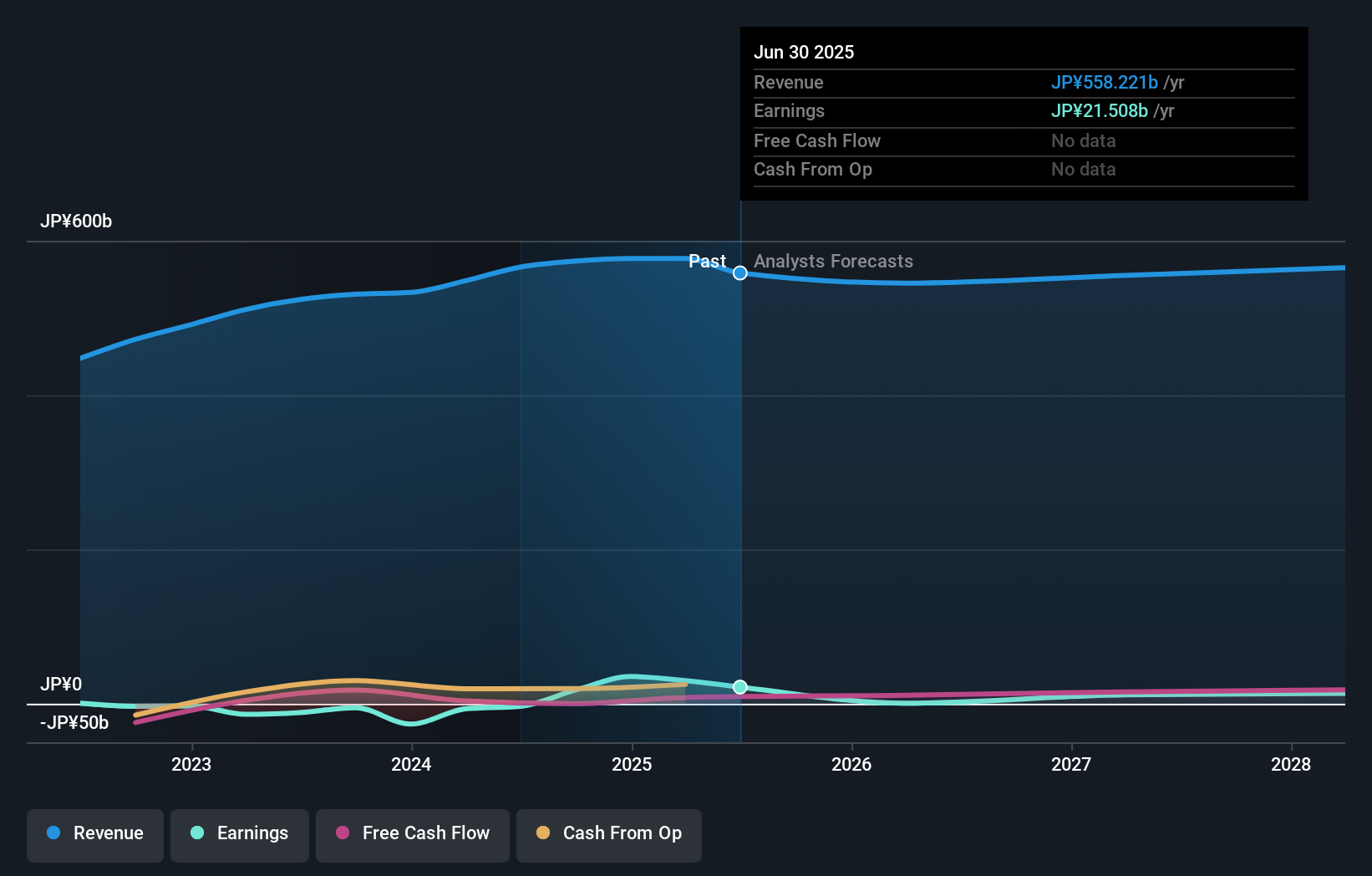- Japan
- /
- Tech Hardware
- /
- TSE:6588
Shareholders in Toshiba Tec (TSE:6588) have lost 30%, as stock drops 8.7% this past week
For many, the main point of investing is to generate higher returns than the overall market. But the main game is to find enough winners to more than offset the losers So we wouldn't blame long term Toshiba Tec Corporation (TSE:6588) shareholders for doubting their decision to hold, with the stock down 33% over a half decade. And it's not just long term holders hurting, because the stock is down 21% in the last year. On top of that, the share price is down 8.7% in the last week.
Since Toshiba Tec has shed JP¥14b from its value in the past 7 days, let's see if the longer term decline has been driven by the business' economics.
While markets are a powerful pricing mechanism, share prices reflect investor sentiment, not just underlying business performance. One imperfect but simple way to consider how the market perception of a company has shifted is to compare the change in the earnings per share (EPS) with the share price movement.
Toshiba Tec became profitable within the last five years. That would generally be considered a positive, so we are surprised to see the share price is down. Other metrics may better explain the share price move.
The modest 1.6% dividend yield is unlikely to be guiding the market view of the stock. Revenue is actually up 7.5% over the time period. A more detailed examination of the revenue and earnings may or may not explain why the share price languishes; there could be an opportunity.
The image below shows how earnings and revenue have tracked over time (if you click on the image you can see greater detail).

We know that Toshiba Tec has improved its bottom line over the last three years, but what does the future have in store? Take a more thorough look at Toshiba Tec's financial health with this free report on its balance sheet.
What About Dividends?
When looking at investment returns, it is important to consider the difference between total shareholder return (TSR) and share price return. The TSR is a return calculation that accounts for the value of cash dividends (assuming that any dividend received was reinvested) and the calculated value of any discounted capital raisings and spin-offs. It's fair to say that the TSR gives a more complete picture for stocks that pay a dividend. As it happens, Toshiba Tec's TSR for the last 5 years was -30%, which exceeds the share price return mentioned earlier. And there's no prize for guessing that the dividend payments largely explain the divergence!
A Different Perspective
Investors in Toshiba Tec had a tough year, with a total loss of 20% (including dividends), against a market gain of about 23%. However, keep in mind that even the best stocks will sometimes underperform the market over a twelve month period. Unfortunately, last year's performance may indicate unresolved challenges, given that it was worse than the annualised loss of 5% over the last half decade. Generally speaking long term share price weakness can be a bad sign, though contrarian investors might want to research the stock in hope of a turnaround. It's always interesting to track share price performance over the longer term. But to understand Toshiba Tec better, we need to consider many other factors. Take risks, for example - Toshiba Tec has 2 warning signs (and 1 which doesn't sit too well with us) we think you should know about.
If you would prefer to check out another company -- one with potentially superior financials -- then do not miss this free list of companies that have proven they can grow earnings.
Please note, the market returns quoted in this article reflect the market weighted average returns of stocks that currently trade on Japanese exchanges.
Valuation is complex, but we're here to simplify it.
Discover if Toshiba Tec might be undervalued or overvalued with our detailed analysis, featuring fair value estimates, potential risks, dividends, insider trades, and its financial condition.
Access Free AnalysisHave feedback on this article? Concerned about the content? Get in touch with us directly. Alternatively, email editorial-team (at) simplywallst.com.
This article by Simply Wall St is general in nature. We provide commentary based on historical data and analyst forecasts only using an unbiased methodology and our articles are not intended to be financial advice. It does not constitute a recommendation to buy or sell any stock, and does not take account of your objectives, or your financial situation. We aim to bring you long-term focused analysis driven by fundamental data. Note that our analysis may not factor in the latest price-sensitive company announcements or qualitative material. Simply Wall St has no position in any stocks mentioned.
About TSE:6588
Toshiba Tec
Offers retail and workplace solutions in Japan and internationally.
Undervalued with excellent balance sheet.
Similar Companies
Market Insights
Community Narratives



